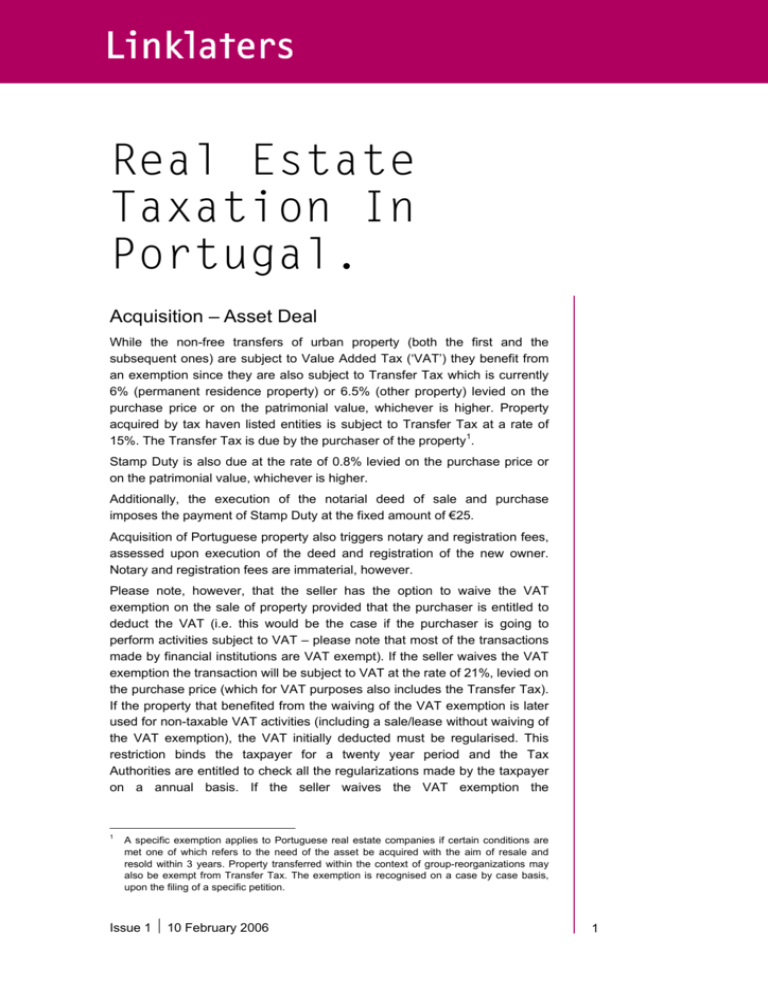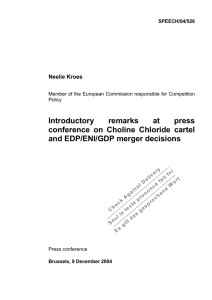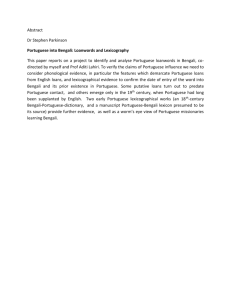
Real Estate
Taxation In
Portugal.
Acquisition – Asset Deal
While the non-free transfers of urban property (both the first and the
subsequent ones) are subject to Value Added Tax (‘VAT’) they benefit from
an exemption since they are also subject to Transfer Tax which is currently
6% (permanent residence property) or 6.5% (other property) levied on the
purchase price or on the patrimonial value, whichever is higher. Property
acquired by tax haven listed entities is subject to Transfer Tax at a rate of
15%. The Transfer Tax is due by the purchaser of the property1.
Stamp Duty is also due at the rate of 0.8% levied on the purchase price or
on the patrimonial value, whichever is higher.
Additionally, the execution of the notarial deed of sale and purchase
imposes the payment of Stamp Duty at the fixed amount of €25.
Acquisition of Portuguese property also triggers notary and registration fees,
assessed upon execution of the deed and registration of the new owner.
Notary and registration fees are immaterial, however.
Please note, however, that the seller has the option to waive the VAT
exemption on the sale of property provided that the purchaser is entitled to
deduct the VAT (i.e. this would be the case if the purchaser is going to
perform activities subject to VAT – please note that most of the transactions
made by financial institutions are VAT exempt). If the seller waives the VAT
exemption the transaction will be subject to VAT at the rate of 21%, levied on
the purchase price (which for VAT purposes also includes the Transfer Tax).
If the property that benefited from the waiving of the VAT exemption is later
used for non-taxable VAT activities (including a sale/lease without waiving of
the VAT exemption), the VAT initially deducted must be regularised. This
restriction binds the taxpayer for a twenty year period and the Tax
Authorities are entitled to check all the regularizations made by the taxpayer
on a annual basis. If the seller waives the VAT exemption the
1
A specific exemption applies to Portuguese real estate companies if certain conditions are
met one of which refers to the need of the asset be acquired with the aim of resale and
resold within 3 years. Property transferred within the context of group-reorganizations may
also be exempt from Transfer Tax. The exemption is recognised on a case by case basis,
upon the filing of a specific petition.
Issue 1 ⏐ 10 February 2006
1
abovementioned 0.8% Stamp Duty is not due. The Transfer Tax, however,
will always be due.
Finally, the owner of the property is liable to pay an annual Municipal Tax at
rates which vary from (i) 0.4% to 0.8% or (ii) 0.2% to 0.5%, depending on the
type of evaluation to which property was subject. More precisely, transfers of
property that took place after 1st December 2003 will determine the
evaluation of the property based on predetermined market criteria and the
rates range from 0.2% to 0.5% for these properties. The remaining
properties were evaluated applying official devaluation coefficients to the
former patrimonial values and the applicable rates range from 0.4% to
0.8%2. Property held by tax haven listed entities is subject to Transfer Tax at
a rate of 5%.
Acquisition – Share Deal
If instead of an asset deal the acquisition of the property is made by means
of a share deal, the 0.8% Stamp Duty, the notary and registry fees and the
Transfer Tax are avoided. In this case Stamp Duty in the amount of €5 is
due if the agreement is executed within Portuguese territory.
Please note, however, that the present tax treatment is not applicable in
cases were at least 75% of Portuguese quota company (a company whose
share capital is represented by quotas and not by shares) capital is acquired
by a single entity.
Lease
The lease of property implies the payment of Stamp Duty in the amount
corresponding to 10% of one month’s rent and benefits from a VAT
exemption. However, the landlord may waive the VAT exemption provided
that the tenant is entitled to deduct the VAT paid on the rents (i.e. this would
be the case if the tenant is going to perform activities subject to VAT –
please note that most of the transactions made by financial institutions are
VAT exempt). If the landlord waives the VAT exemption, the lease is subject
to VAT at the rate of 21% levied on the rents amount. If the landlord waives
the VAT exemption the above mentioned 10% Stamp Duty is not due.
2
2
A specific exemption applies to Portuguese real estate companies if certain conditions are
met one of which refers to the need of the asset be acquired with the aim of resale and
resold within 3 years.
Issue 1 ⏐ 10 February 2006
Direct Investment – Foreign Investor
Lease
The mere holding of properties located in Portugal does not imply by itself
the existence of a Permanent Establishment (‘PE’) in Portugal for direct
tax purposes. As a rule, a non-resident entity will only have a PE in
Portugal if it has (i) a “fixed place of business” in the Portuguese territory
through which its activities are wholly or partly carried out or, (ii) if it has
an agent in Portugal (different from an independent agent) empowered to
act and to enter into agreements on behalf of the non-resident entity. In
the case of lease of properties it can be anticipated that a non-resident
entity would have a PE in Portugal if it had an office (i.e. either owned or
rented) and /or a full-time employee in Portugal (ideally with powers to
sign lease agreements).
Assuming that there is no PE in Portugal, income obtained by a nonresident entity from the lease of properties located in Portugal without a
PE will be subject to Portuguese taxation. More precisely, the said
income will be subject to Corporate Income Tax (‘CIT’) at the rate of 15%
on the gross amount of the lease payments with the right to deduct only
(i) maintenance and preservation expenses and (ii) the Municipal Tax. It
will not be possible, therefore, to deduct substantial expenses such as
depreciation charges and financial expenses. Lease payments collected
by a non-resident entity will be subject to a withholding tax of 15% on
their gross amount on account of the final CIT.
In order to recover any excess withholding tax (i.e. due to tax deductible
expenses), and to comply with the remaining tax statement obligations,
the non-resident entity must file a CIT Return declaring the lease income
less deductible expenses. Any excess withholding tax over the CIT final
tax liability will then be reimbursed by the Public Treasury.
Among other formalities, non-residents without a PE in Portugal are
obliged to appoint an individual or a company resident in Portugal as their
representative before the Portuguese Tax Authorities. The non-fulfilment
of this obligation is considered a tax infringement.
Capital Gains
In general, capital gains obtained by a non-resident entity upon disposal
of properties located in Portugal are subject to CIT at a 25% rate. The
capital gains correspond to the difference between sale value (transfer
price3) less acquisition historic cost (this value being updated by official
3
Should the patrimonial value of the property, as determined by the new evaluation system,
be higher than the sale price, for the purposes of “transfer price” the value to be considered
is the patrimonial value. However, the same rule applies to the acquisition historic cost (if the
patrimonial value of the property, as determined by the new evaluation system, is higher
than the acquisition historic cost, the value to be considered is the patrimonial value).
Real Estate Taxation In Portugal.
3
devaluation coefficients - monetary correction - if more than two years
have passed since the acquisition) less costs incurred in the valorisation
of the property in the last five years as well as costs incurred in the
acquisition and sale of the property (financial costs not included).
The purchaser of properties is not bound to withhold any tax.
Consequently, in order to tax the capital gains it is necessary for the nonresident tax legal representative to file a CIT Return.
Indirect Investment4
Lease
Lease income is subject to CIT at a maximum rate of 27.5% (it includes
the CIT surtax) on a taxable income determined under CIT Code rules
and principles. This means that all expenses related to the leasing activity
(i.e. depreciation charges - 2% a year on 75% of the global value, unless
the value of the land is known in which case the respective value will not
be subject to depreciation - and financial expenses) are, in general, taxdeductible.
Portuguese PEs and companies are entitled to some tax credits and to
carry forward tax losses (six years).
The lessee has to withhold 15% on the lease payments on account of the
final tax liability.
If the company conducts the activity of management of owned property
no withholding will be made by the paying entity.
Capital Gains
Capital gains made on the sale of properties are subject to CIT at the rate
of 27.5% on the difference between transfer price5 and tax basis of the
property (i.e. acquisition historic cost less tax deductible depreciation)
updated with official devaluation coefficients.
The taxpayer may apply for the reinvestment benefit according to which
only 50% of the capital gains will be taxed to the extent that the sale
proceeds are reinvested in other business assets in a period which runs
4
4
It includes the acquisition of Portuguese properties through a PE or through a Portuguese
Company. It also refers to the tax treatment of Portuguese companies.
5
Should the patrimonial value of the property, as determined by the new evaluation system,
be higher than the sale price, for the purposes of “transfer price” the value to be considered
is the patrimonial value. However, the same rule applies to the acquisition historic cost (if the
value of the property, as determined by the new evaluation system, is higher than the
acquisition historic cost, the value to be considered is the patrimonial value, which is also the
value considered for depreciation purposes). In any case, it is possible for the taxpayer to
prove that the transaction effective value was lower than the patrimonial value.
Issue 1 ⏐ 10 February 2006
from the year before the transfer is made and the two following years
(and provided that some additional requirements are met).
No withholding tax has to be applied by the purchaser of the properties.
Taxation of Shareholder
As a rule, dividends distributed by a Portuguese company to resident CIT
taxpayers are not subject to withholding tax nor to taxation at the level of
the shareholder provided that (i) the Portuguese company has its headoffice or effective management in Portugal and is subject and not exempt
from CIT, (ii) the Portuguese company is not under the transparency
framework and that (iii) the shareholder has a direct holding not lower
than 10%, or with an acquisition value not lower than € 20,000,000, held
for a minimum period of one year prior to the dividend distribution
(exception made when specific anti-avoidance provisions are deemed to
exist).
Dividends distributed to non-resident entities without a permanent
establishment in Portugal will not be subject to taxation in Portugal if paid
to EU companies that qualify under the EU Parent / Subsidiary Directive
provided that they are paid out of a minimum stake of 20% held for a two
year period.
In all the other cases, a maximum 20% rate applies. This rate can be
reduced to a 5% to 15% rate under the relevant Double Tax Treaty.
In a sale of shares scenario, the eventual capital gains may benefit from
an exemption depending on the relevant Double Tax Treaty.
Portuguese Real Estate Fund (‘Portuguese REF’)
Acquisition and Holding of Portuguese Real Estate
Portuguese REF benefit from an exemption of Transfer Tax and
Municipal Tax.
Lease Income
Lease income is subject to an autonomous taxation at the rate of 20%
applicable on the gross amount of the lease payments with right to
deduct only maintenance and preservation expenses. The lessee does
not make any withholding. The tax must be delivered by the
correspondent management company by the end of April of the following
year. Any tax withheld by the lessee shall be considered a payment on
account of the final tax due.
At the level of a Portuguese REF, no financial cost is allowed, nor any
depreciation is made.
Real Estate Taxation In Portugal.
5
In order to allow the deduction of tax deductible costs mentioned above,
the respective support documentation is needed.
Capital Gains
Capital gains deriving from the disposal of properties are subject to an
autonomous taxation at the rate of 25% applicable on half (50%) of the
positive balance of capital gains and losses made each year. In final
terms, they are subject to a tax rate of 12.5%. In order to assess the
taxable capital gains, the applicable rules are the ones in force for
individuals: sale value less acquisition historic cost (this value being
updated by official devaluation coefficients - monetary correction - if more
than two years have passed since the acquisition) less costs incurred in
the valorisation of the property in the last five years as well as costs
incurred in the acquisition and sale of the property (financial costs not
included)6. The tax must be delivered by the correspondent management
company by the end of April of the following year.
At the level of a Portuguese REF, no financial cost is allowed, nor is any
depreciation made.
In order to allow the deduction of tax deductible costs mentioned above,
the respective support documentation is needed.
Other Income
Other income (not qualified as lease income or capital gains) is, as a rule,
subject to an autonomous taxation at the rate of 25% applicable on the
net value obtained each year. Some reduced rates apply, depending on
the type of income and by means of withholding tax. The taxation
framework follows the tax framework for individuals, however, under
which the financial costs are not tax deductible. Where the withholding
tax rule does not apply, the tax must be delivered by the correspondent
management company by the end of April of the following year.
Income obtained outside the Portuguese territory (not qualified as lease
income or capital gains) is subject to an autonomous taxation at the rate
of 20% (if dealing with income of debt instruments, distributed dividends
or income of units of investment funds) or at the rate of 25% (for the other
types of income), applicable on the net value obtained each year. The tax
must be delivered by the correspondent management company until the
end of April of the following year. The deduction of tax credits emerging
from international double taxation is limited to the lower of the following
values (i) tax paid outside of the Portuguese territory or (ii) tax that would
have been paid by the Portuguese REF should the income have been
obtained in Portugal, in both cases never in excess of the tax that is due
under the relevant Double Tax Treaty (if in force and potentially
6
6
See footnote 3.
Issue 1 ⏐ 10 February 2006
applicable). The international double taxation credit is assessed on a
country by country and on an income by income basis and the income
that grants the right to such credit must be considered by its gross value.
Capital gains (other than the ones deriving from the disposal of
properties) are subject to an autonomous taxation at the rate of 10%
applicable on the positive balance of capital gains and losses made each
year (in some cases an exemption may apply). The tax must be delivered
by the correspondent management company by the end of April of the
following year.
At the level of a Portuguese REF no financial cost is allowed.
In order to allow the deduction of tax deductible costs mentioned above,
the respective support documentation is needed.
Taxation of Unitholders
Income obtained by Corporate Income Tax (‘CIT’) resident taxpayers on
units of a Portuguese REF is not subject to withholding tax. However, the
income paid on the units is considered as a taxable gain at the level of
the unitholder and subject to taxation at the general CIT tax rate (25%)
plus the municipal surtax (2.5%). Tax paid by the fund may be credited
against CIT due at the level of the unitholder. Should the fund distribute
income attributable to dividends on shareholdings held by it, the
unitholders are allowed to deduct 50% of this amount from their taxable
income. For that purpose the management company must publish the
value of the income paid to the unitholder, the amount of the tax withheld
on the income to the fund or directly paid by it and the value of the
deduction regarding the dividends.
The tax withheld to or paid by the fund must be reimbursed to the
relevant unitholder by the correspondent management company together
with the payment of the income of the respective units, should the
Portuguese CIT be exempt from tax and, due to such exemption, not
obliged to file a tax return. In such cases, the management company
shall deduct the tax reimbursed to the total amount of tax that it has to
deliver to the Portuguese treasury under the rules mentioned above. Any
tax credit held by the management company may be reimbursed by the
Portuguese treasury or credited against future payments of tax to be
made by it.
Real Estate Taxation In Portugal.
7
Income obtained by non-resident entities without a permanent
establishment in Portugal on units of a Portuguese REF is exempt from
CIT.
Portuguese Funds of Funds (‘Portuguese FF’)
Income of Units of Portuguese Funds
Income of units of Portuguese funds is exempt. However, the Portuguese
FF shall not be entitled to the reimbursement of the tax withheld to or
paid by the relevant fund, as is the case with CIT exempt unitholders of
Portuguese REF.
Other Income
Other income (not qualified as income of units of Portuguese funds) shall
follow the tax framework applicable to regular Portuguese funds.
Taxation of Unitholders
Income obtained by CIT resident taxpayers on units of a Portuguese FF
is not subject to withholding tax and only 40% of the income paid on the
units is considered as a taxable gain at the level of the unitholder and
subject to taxation at the general CIT tax rate (25%) plus the municipal
surtax (2.5%). The tax withheld to or paid by the fund may not, however,
be credited against CIT due at the level of the unitholder, as is the case
with unitholders of Portuguese REF. On the other hand, the tax withheld
to or paid by the fund will not be reimbursed to the relevant unitholder
even if the Portuguese CIT is exempt from tax and, due to such
exemption, not obliged to file a tax return, as is the case with unitholders
of Portuguese REF.
Income obtained by non-resident entities without a permanent
establishment in Portugal on units of a Portuguese REF is exempt from
CIT.
Contacts
Patrick Dewerbe
patrick.dewerbe@linklaters.com
Tânia de Almeida Ferreira
tania.ferreira@linklaters.com
This publication is intended merely to highlight issues and not to be comprehensive, nor to provide legal advice. Should
you have any questions on issues reported here or on other areas of law, please contact one of your regular contacts at
Linklaters, or contact the editors.
© Linklaters. All Rights reserved 2006
Lisbon
Avenida Fontes Pereira de Melo, 14-15º
1050-121 Lisbon, Portugal
Tel: (351) 21 864 00 00
Fax: (351) 21 864 00 01
8
A05948514/0.2/15 Fev 2006
Please refer to www.linklaters.com/regulation for important information on the regulatory position of the firm.
We currently hold your contact details, which we use to send you newsletters such as this and for other marketing and
business communications.
We use your contact details for our own internal purposes only. This information is available to our offices worldwide and
to those of our associated firms.
If any of your details are incorrect or have recently changed, or if you no longer wish to receive this newsletter or other
marketing communications, please let us know by emailing us at marketing.database@linklaters.com








